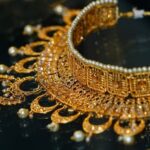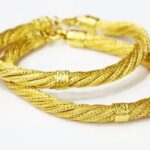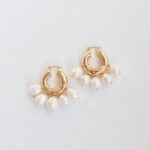Do jewelry stores buy back diamonds? This is a common question that many individuals have when considering selling their diamonds. Diamonds hold both sentimental and financial value, which can lead to a desire to sell them for various reasons. In this article, we will explore the factors influencing jewelry stores’ buyback policies, how they evaluate the worth of diamonds, and the challenges faced by those looking to sell their diamonds.
The decision to sell diamonds can arise from a variety of circumstances. Whether it’s due to a change in personal taste, financial need, or the desire to upgrade or downsize one’s jewelry collection, there are numerous reasons why individuals may consider selling their diamonds. Understanding these motivations is key to navigating the diamond buyback process effectively.
Jewelry stores play a significant role in the diamond buyback market. However, their policies on buying back diamonds can be influenced by various factors. These factors may include market demand, current trends, and the store’s overall inventory strategy. By understanding these influences, sellers can gain insight into why certain offers may vary among different jewelry stores.
As you venture into selling your diamonds, it is essential to comprehend how jewelry stores assess the condition and quality of your precious stone. Factors such as cut, color, clarity, and carat weight all contribute to its value. Jewelry stores employ expert gemologists who carefully evaluate these aspects before determining an offer for your diamond.
In this article, we will delve deeper into these topics while providing advice on finding reputable jewelry stores offering diamond buyback programs. We will also discuss alternatives to selling through traditional channels and provide a step-by-step guide on preparing for a successful transaction. So if you’re contemplating selling your diamonds or simply curious about how jewelry stores handle buybacks, continue reading to gain valuable insights that will help you make informed decisions throughout the process.
Why Sell Your Diamonds
Diamonds are one of the most precious and valuable gemstones in the world, so it may seem counterintuitive to consider selling them. However, there are various reasons why someone might want to sell their diamonds. This section will explore some of the common motivations behind diamond sales.
1. Financial Reasons:
One of the most common reasons individuals decide to sell their diamonds is for financial gain. Life circumstances such as unexpected medical expenses, debt repayment, or unanticipated bills may require individuals to liquidate their assets for cash. Diamonds, especially those with a high clarity and carat weight, can fetch a significant amount of money when sold to jewelry stores that buy back diamonds.
2. Upgrading or Reinvestment:
Another reason people may choose to sell their diamonds is to upgrade or reinvest in a different piece of jewelry or other investment opportunities. Whether it’s upgrading an engagement ring or diversifying one’s investment portfolio, selling diamonds can provide funds for these endeavors.
3. Emotional Attachment:
While not as common as financial reasons, some individuals may have emotional attachments to their diamonds that they no longer wish to keep. For example, heirloom pieces with sentimental value from previous generations may not align with one’s personal style or preferences. In such cases, selling the diamond allows individuals to let go of something that no longer holds meaning for them and turn it into something more personally significant.
4. Change in Taste or Lifestyle:
As time passes by, people’s tastes and lifestyles often change. What once appealed to someone might no longer suit their preferences or lifestyle choices. Selling a diamond enables individuals to let go of jewelry that no longer resonates with who they are in the present moment and use the funds towards acquiring pieces that align better with their current style and lifestyle.
Factors Influencing the Buyback Policy of Jewelry Stores
When it comes to selling your diamonds, understanding the factors that influence the buyback policy of jewelry stores is crucial. Jewelry stores have specific criteria and considerations that impact their decision to buy back diamonds from customers. These factors vary across different stores and can include market conditions, current inventory, and customer demand.
One factor that greatly influences a jewelry store’s buyback policy is market conditions. The value of diamonds can fluctuate based on supply and demand in the market. When the demand for diamonds is high and supply is low, jewelry stores may be more inclined to buy back diamonds at a higher price. Conversely, if there is an oversupply of diamonds in the market, jewelry stores may lower their buyback offers or decline to buy altogether.
Another consideration for jewelry stores is their current inventory. Stores need to carefully manage their diamond inventory to ensure they have a variety of options available for their customers. If a store already has an excess of certain diamond shapes or sizes, they may not be interested in buying back additional pieces that match their existing inventory. However, if a piece has unique characteristics or fills a gap in their inventory, they may be more willing to make an offer.
Customer demand also plays a significant role in a jewelry store’s decision to buy back diamonds. Jewelry stores assess the likelihood of being able to resell a diamond after purchasing it from a customer.
If there is high demand for certain types of diamonds among their customer base, they are more likely to consider buying them back. On the other hand, if there is little interest from customers in purchasing second-hand diamonds, jewelry stores may be less inclined to participate in buyback programs.
Understanding these various factors helps individuals looking to sell their diamonds navigate the process with realistic expectations. By researching different jewelry stores and their specific policies regarding diamond buybacks, sellers can better assess where they are likely to receive the most favorable offer. Ultimately, it is important for sellers to be aware of the market conditions, the store’s inventory needs, and the customer demand in order to maximize their chances of a successful transaction.
Assessing the Condition and Quality
When it comes to selling diamonds to jewelry stores, understanding how these establishments evaluate the condition and quality of your diamonds is essential. Jewelry stores employ experts who specialize in assessing the worth of diamonds, taking into consideration several factors. By knowing what criteria they use to determine the value, you can better prepare yourself for the selling process.
One crucial factor that jewelry stores consider is the 4Cs: Carat weight, Color, Clarity, and Cut. Carat weight refers to the size of the diamond, with larger carat weights typically commanding higher prices. The color of a diamond can vary from colorless to yellow or even fancy colors like blue or pink. Generally, colorless diamonds are more valuable.
Clarity refers to the presence or absence of internal flaws and external blemishes. The fewer imperfections a diamond has, the higher its clarity grade will be, thereby increasing its value. Finally, cut determines how well a diamond’s facets interact with light. A well-cut diamond reflects light beautifully and therefore tends to have a higher value.
Aside from the 4Cs, jewelry stores also consider other aspects when assessing diamond worth. These include the shape of the diamond (round, princess cut, oval) and any additional features such as fluorescence or enhancements like laser drilling or fracture filling. All these factors are taken into account to determine an accurate estimate of your diamond’s worth.
To provide transparency in their evaluation process, some jewelry stores might be willing to show customers how they assess a diamond’s condition and quality. This allows you as a seller to understand their rationale behind pricing decisions and verify that their assessment aligns with industry standards.
Overall,diamonds’ condition and quality evaluations by jewelry stores depend on various factors such as carat weight,color clarity,cut,and many more.A shopper should research components affecting market volume from websites providing unbiased data before settling on a choices of concerned markets.
Challenges in Selling Diamonds
Selling diamonds can be a complex process, and there are several challenges that individuals may face when attempting to sell their diamonds. Understanding these common hurdles can help sellers navigate through the process more effectively.
One of the main challenges in selling diamonds is determining the true value of the stone. As diamonds are unique and their value is determined by a variety of factors such as cut, color, clarity, and carat weight, accurately assessing their worth can be difficult for someone without expertise in gemology. Sellers may also encounter challenges when trying to find a reputable buyer who will offer a fair price for their diamonds.
Another challenge in selling diamonds is finding potential buyers who are interested in purchasing second-hand or pre-owned stones. While jewelry stores do buy back diamonds, it is important to note that they may only offer a fraction of the original purchase price as they also need to consider factors such as overhead costs and market demand.
Furthermore, trustworthiness and credibility can pose as obstacles when dealing with certain buyers or platforms. Sellers must exercise caution when seeking out potential buyers to avoid falling victim to scams or receiving lowball offers.
To overcome these challenges, there are several steps sellers can take. First and foremost, it is crucial to educate oneself about the 4Cs (cut, color, clarity, carat) and have an understanding of how these aspects influence diamond value. Seeking professional appraisals from certified gemologists can also provide sellers with accurate assessments of their diamonds’ worth.
Additionally, researching reputable jewelry stores with positive customer reviews and a history of fair transactions is essential before deciding on where to sell your diamond. Sellers should also consider exploring alternative platforms such as online marketplaces or consignment stores that specialize in selling pre-owned jewelry.
By being proactive in addressing these challenges and taking the necessary precautions, individuals looking to sell their diamonds can increase their chances of having successful transactions while maximizing their return on investment.
Pros and Cons of Selling to Jewelry Stores
Selling your diamonds to jewelry stores can have both advantages and disadvantages. It is important to weigh these factors before deciding whether or not to sell your diamonds to a jewelry store.
One of the main benefits of selling to a jewelry store is convenience. Jewelry stores often have buyback programs in place, allowing you to sell your diamonds directly to them without the need for a middleman or third-party platform. This means that the process can be relatively quick and straightforward, with no need for additional steps such as listing your diamond for sale and dealing with potential buyers.
Another advantage of selling to a jewelry store is the potential for a higher offer price compared to other platforms. Jewelry stores have expertise in assessing the value of diamonds, so they are more likely to offer a fair price based on the quality and condition of your diamond. Additionally, some jewelry stores may also consider factors such as the brand name or desirability of certain diamond cuts, which could result in a higher offer.
However, there are also some drawbacks to consider when selling your diamonds to jewelry stores. One major disadvantage is that you may receive a lower price compared to selling privately or through other methods such as auctions or online platforms. Jewelry stores typically need to resell the diamonds at a profit, so they may offer less than what you could potentially get if you were willing to put in more effort and time into finding a buyer yourself.
Furthermore, selling to a jewelry store might not provide you with an opportunity for negotiations. Unlike private sales where you can negotiate the price with interested buyers, most jewelry stores have set prices and will only offer what they believe is appropriate based on their evaluation.
In summary, selling your diamonds to jewelry stores has its pros and cons. While it offers convenience and potentially higher offers compared to other platforms, you might not receive the maximum value for your diamond. It’s important to carefully consider these factors before making a decision.
| Pros of Selling to Jewelry Stores | Cons of Selling to Jewelry Stores |
|---|---|
| Convenience | Potentially lower offer compared to private sales or other platforms |
| Possible higher offer price based on expertise in assessing diamond value | Lack of opportunity for negotiations |
Finding the Right Jewelry Store
Finding the right jewelry store is crucial when you are looking to sell your diamonds. Not all jewelry stores offer diamond buyback programs, and even among those that do, the terms and conditions can vary significantly. Here are some tips to help you identify trustworthy and reputable stores that offer diamond buyback:
- Research and read reviews: Start by doing thorough research on different jewelry stores in your area or online. Look for customer reviews and ratings to get an idea of their reputation. Pay attention to any feedback specifically related to their diamond buyback program.
- Check for credentials: Look for jewelry stores that have industry affiliations or certifications, such as being a member of organizations like the Jewelers of America or the Gemological Institute of America (GIA). These affiliations indicate that the store adheres to certain standards and practices.
- Inquire about their buyback policy: Contact the jewelry stores you are interested in and inquire about their diamond buyback policy. Ask about their criteria for purchasing diamonds, such as minimum carat weight, cut, color, clarity, etc. Also, ask if they provide any documentation for the evaluation process.
- Compare offers: Get quotes from multiple jewelry stores before making a decision. This will allow you to compare offers and ensure that you are getting a fair price for your diamonds. However, keep in mind that while price is important, it shouldn’t be the sole factor in your decision-making process.
- Seek recommendations: Ask friends, family members, or colleagues who have previously sold their diamonds for recommendations on trusted jewelry stores with buyback programs. Personal experiences can give valuable insights into the credibility and reliability of a store.
By following these tips, you can increase your chances of finding a trustworthy and reputable jewelry store that offers fair prices for buying back your diamonds.
| Tips | Description |
|---|---|
| Research and read reviews | Start by doing thorough research on different jewelry stores in your area or online. Look for customer reviews and ratings to get an idea of their reputation. |
| Check for credentials | Look for jewelry stores that have industry affiliations or certifications, such as being a member of organizations like the Jewelers of America or the Gemological Institute of America (GIA). |
| Inquire about their buyback policy | Contact the jewelry stores you are interested in and inquire about their diamond buyback policy. Ask about their criteria for purchasing diamonds, such as minimum carat weight, cut, color, clarity, etc. |
| Compare offers | Get quotes from multiple jewelry stores before making a decision. This will allow you to compare offers and ensure that you are getting a fair price for your diamonds. |
| Seek recommendations | Ask friends, family members, or colleagues who have previously sold their diamonds for recommendations on trusted jewelry stores with buyback programs. |
Alternatives to Jewelry Stores
Online Auctions and Marketplaces
One alternative to selling diamonds at a jewelry store is to explore online auctions and marketplaces. Platforms like eBay, Craigslist, and other online auction sites provide individuals with the opportunity to showcase their diamonds to a broader audience of potential buyers.
Selling your diamonds through these platforms can often yield higher prices compared to selling them directly to a jewelry store. However, it is important to keep in mind that there may be fees associated with listing and selling items on these platforms.
Diamond Brokers
Another option for selling diamonds is through diamond brokers. Diamond brokers act as intermediaries between sellers and buyers, using their extensive knowledge of the diamond industry to help facilitate transactions.
These professionals have established networks and connections within the industry, allowing them to find interested buyers who may be willing to pay top dollar for your diamonds. Diamond brokers typically charge a commission fee based on the final sale price, so it’s important to consider this when deciding whether or not to work with one.
Private Buyers
If you prefer a more personal approach, selling your diamonds directly to private buyers can be an option worth exploring. This could include reaching out to family, friends, or acquaintances who may be interested in buying your diamonds or connecting with potential buyers through social media platforms or online classifieds.
Selling directly to private buyers has the advantage of eliminating any additional fees or commissions associated with intermediaries like jewelry stores or brokers. However, it does require more effort on your part in terms of marketing and finding interested buyers.
Keep in mind that regardless of the platform or method you choose for selling your diamonds, it’s essential to take necessary precautions when transacting with strangers or unfamiliar individuals online. Ensure that you are meeting in safe environments for face-to-face transactions and consider obtaining professional appraisals or certifications for your diamonds beforehand to establish credibility and authenticity.
Exploring these alternatives to jewelry stores can provide you with more flexibility and potentially higher offers. It’s important to weigh the benefits and drawbacks of each option, considering factors such as convenience, pricing, safety, and your individual goals and circumstances when deciding where to sell your diamonds.
Steps to Prepare for Selling
When preparing to sell your diamonds to a jewelry store, there are several steps you can take to ensure a smooth and successful transaction. By following this step-by-step guide, you can increase your chances of getting the best value for your diamonds and have a positive selling experience.
- Research the Market: Before approaching any jewelry store, it’s important to do some research on diamond prices and market trends. This will give you an idea of what to expect in terms of offers and help you determine a reasonable asking price. Online resources, such as diamond pricing guides and marketplaces, can provide valuable insights.
- Clean and Inspect Your Diamonds: Take the time to clean your diamonds thoroughly using appropriate cleaning solutions or methods recommended by experts. Inspect each diamond closely for any visible flaws or damage that could affect its value. Note down these observations so that you can discuss them with the jeweler during the evaluation process.
- Gather Documentation: Collect any paperwork related to your diamonds, including certificates from gemological laboratories, receipts, and appraisals. Having these documents readily available can help validate the authenticity and quality of your diamonds, giving potential buyers more confidence in their purchase.
- Visit Multiple Jewelry Stores: It’s generally recommended to visit multiple jewelry stores to get different offers for comparison purposes. This allows you to evaluate different buyback policies and determine which store is offering the best value for your diamonds. Remember to inquire about their return policy if you’re not satisfied with their initial offer.
- Negotiate with Confidence: Armed with knowledge about diamond prices and market trends, negotiate confidently with jewelers during the buying process. Be open to discussing any concerns or questions you may have about their evaluation methods or pricing strategies. Remember that polite communication goes a long way in establishing trust with potential buyers.
By preparing yourself adequately before selling your diamonds, you are more likely to have a successful transaction that leaves both parties satisfied. Following these steps will not only help you get the best value for your diamonds but also provide you with peace of mind throughout the selling process.
Frequently Asked Questions
In conclusion, selling diamonds to jewelry stores can be a viable option for those looking to part ways with their precious stones. Throughout this article, we have explored the value of diamonds and the various reasons why individuals may want to sell them. We have also delved into the factors influencing jewelry stores’ buyback policies, as well as how they assess the condition and quality of diamonds.
It is important to note that selling diamonds to jewelry stores does come with its set of challenges. Common hurdles include unrealistic expectations about prices, difficulty in finding trustworthy stores, and the time-consuming nature of the process. However, by understanding these potential obstacles and following a step-by-step guide on how to prepare for selling diamonds, individuals can increase their chances of a successful transaction.
While jewelry stores are a popular option for selling diamonds, it is not the only avenue available. Exploring other platforms and methods such as online marketplaces or diamond industry professionals may provide alternate opportunities for selling.
Frequently Asked Questions
Can you sell diamonds back to the jewelry store?
Selling diamonds back to a jewelry store is possible, but the process and terms may vary depending on the store’s policies. Some jewelry stores offer buyback programs where they repurchase diamonds from customers, usually at a lower price than the original purchase cost.
However, not all stores have such programs, and some may only accept diamonds that they originally sold. It’s crucial to inquire about a specific store’s diamond buyback policy before attempting to sell a diamond back to them.
Can you sell a diamond to a jeweler?
Yes, it is generally possible to sell a diamond to a jeweler. Many jewelers are interested in purchasing diamonds for resale or other purposes.
They might evaluate the diamond based on factors like its cut, clarity, color, carat weight, and overall quality before offering a price for it. However, keep in mind that the amount offered may be below what you initially paid for it or its appraised value since jewelers need to consider their profit margins and market demand when buying diamonds.
Can I sell back diamond?
The possibility of selling back a diamond depends on various factors such as where you bought it, its condition, and current market conditions. While it is indeed possible to sell back a diamond under certain circumstances, there may be limitations and considerations involved.
It’s advisable to consult with jewelers or experts in the field who can assess the diamond’s characteristics and determine its potential value if you wish to explore selling it back. Additionally, researching different options in the market can help you find potential buyers who might be interested in purchasing your diamond.

Welcome to my jewelry blog! My name is Sarah and I am the owner of this blog.
I love making jewelry and sharing my creations with others.
So whether you’re someone who loves wearing jewelry yourself or simply enjoys learning about it, be sure to check out my blog for insightful posts on everything related to this exciting topic!





